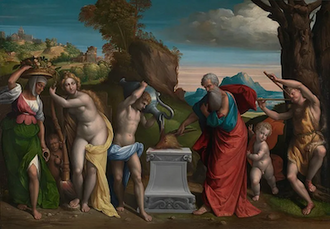Gospel in Art: What I want is mercy, not sacrifice

A Pagan Sacrifice, by Benvenuto Tisi, called Garofalo, 1526 © The National Gallery, London
Source: Christian Art
Gospel of 15 July 2022
Matthew 12:1-8
Jesus took a walk one sabbath day through the cornfields. His disciples were hungry and began to pick ears of corn and eat them. The Pharisees noticed it and said to him, 'Look, your disciples are doing something that is forbidden on the sabbath.' But he said to them, 'Have you not read what David did when he and his followers were hungry - how he went into the house of God and how they ate the loaves of offering which neither he nor his followers were allowed to eat, but which were for the priests alone? Or again, have you not read in the Law that on the sabbath day the Temple priests break the sabbath without being blamed for it? Now here, I tell you, is something greater than the Temple. And if you had understood the meaning of the words: What I want is mercy, not sacrifice, you would not have condemned the blameless. For the Son of Man is master of the sabbath.'
Reflection on the painting
Jesus' words towards the end of today's Gospel reading are clear: 'What I want is mercy, not sacrifice'. This is a quote from Hosea 6:6 (God desires mercy, not sacrifice). It is not just telling us that God wants us to love people more than he wants us to observe ritual holiness. It is telling us in clear terms that God's deepest desire, his biggest wish, is that people come to him and experience his love. God is a God of mercy. He doesn't want perfection, but he wants us to do our best. We will fail, stumble and fall, but in those moments we will experience his abundant forgiveness.
The sacrifices Jesus is describing which he doesn't want, are the sacrifices as depicted in our painting: pagan, superstitious sacrifices. In our painting by Garofalo from 1526, we see a semi-naked man pouring red wine from an amphora onto a goat's head on an altar. A young woman to the left carries an upside-down torch, while an old woman balances a basket of pears, apples and grapes on her head.
However, sacrifices are an important part of our faith. But God wants them to be the right sacrifices, not just mere external, pagan displays of offerings. Only through proper internal sacrifice can we become worthy to live in the presence of God. To gain something in life, we always have to sacrifice something else. To heat your house, you have to sacrifice gas; to get married, you sacrifice your old bachelor life; to lead a healthy life, you have to sacrifice eating crips and chocolates, etc… So it goes for entering the eternal life, we need to sacrifice many tempting pleasures on earth or sacrifice time to those less well off than us. To gain, we have to sacrifice!
LINKS
Christian Art: www.christian.art
Today's image: https://christian.art/daily-gospel-reading/matthew-12-1-8-2022/


















